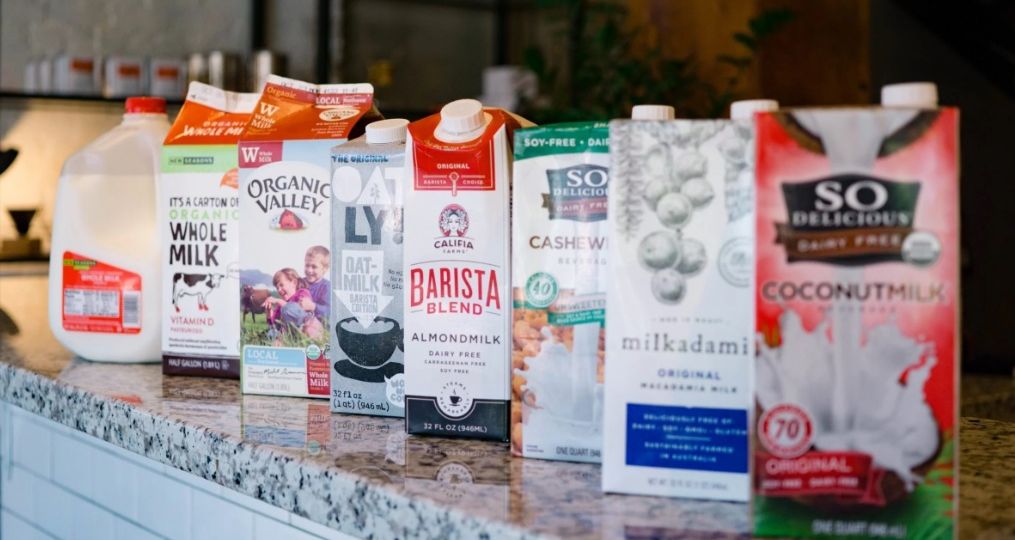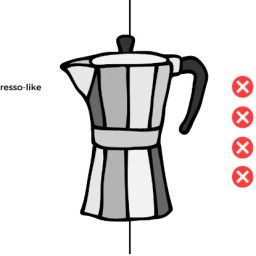
Choosing the right milk for your coffee isn’t just about taste—it’s about transforming your daily brew into a creamy, delightful experience. As coffee culture evolves, so does the variety of milk options available, both dairy and non-dairy. The right milk can enhance the flavor and texture of your coffee, making each sip a perfect balance of smooth and robust.
Key Takeaways about Best Milk For Coffee
- Comparison of dairy and non-dairy milk options: We’ll dive into the pros and cons of each, helping you navigate through choices like whole milk, almond milk, and oat milk.
- Impact of fat content and protein on coffee flavor: Learn how different fat and protein levels in milk affect the richness and body of your coffee.
- Considerations for lactose intolerance and vegan preferences: We’ll discuss lactose-free and plant-based alternatives that ensure no one misses out on great coffee.
- Tips for frothing and steaming milk for perfect coffee drinks: Master the art of milk frothing for that ideal creamy texture, whether you’re making a cappuccino or a latte.
Dairy Milk in Coffee
When it comes to selecting the best dairy milk for coffee, the debate often centers around whole, semi-skimmed, and skimmed milk. Each type offers a unique contribution to your coffee, influencing everything from taste to texture.
Whole Milk: Whole milk is the go-to for many coffee lovers and baristas due to its rich flavor and creamy texture. With a fat content of about 3-4%, whole milk adds a noticeable richness and body to coffee. It froths beautifully, creating a smooth and velvety foam that blends seamlessly into lattes and cappuccinos. The high-fat content not only enhances the mouthfeel but also helps in carrying the natural flavors of the coffee.
Semi-Skimmed Milk: Semi-skimmed milk strikes a balance between creaminess and lightness, making it a popular choice among those who prefer something less heavy than whole milk but more substantial than skim. With approximately 1.5-1.8% fat, semi-skimmed milk still froths well, though the foam may not be as rich or dense as that from whole milk. It offers a milder flavor contribution, allowing the coffee’s natural bitterness to shine through a bit more prominently.
Skimmed Milk: For those looking to reduce calorie intake without giving up dairy, skimmed milk, with less than 0.5% fat, is an option. It is the least creamy of the three and has a lighter, almost watery texture. While it can still be frothed, the foam is less creamy and more airy, which might not hold up as well in heavier, more robust coffee drinks. However, it imparts the least flavor alteration to coffee, making it ideal for those who prefer to taste the full profile of their espresso or Americano.
Non-Dairy Milk Alternatives
In the world of coffee, non-dairy milks have gained a prominent place on the menu. Not only are they essential for those with dietary restrictions, but they also add unique flavors and textures to coffee. Let’s explore some of the most popular non-dairy milk alternatives: soy, almond, oat, and coconut milk.
Soy Milk
Soy milk is a veteran in the realm of plant-based milks used in coffee. It’s known for its creamy texture that mimics dairy quite well, making it a favorite for lattes and cappuccinos. Nutritionally, soy milk is a powerhouse, offering a good amount of protein which helps in creating a stable, rich foam.
Its mild and slightly sweet flavor complements coffee without overpowering it, making it a well-rounded choice for any coffee drink.
Almond Milk
Almond milk offers a slightly nutty flavor and a lighter texture than soy milk, which can appeal to those who prefer their coffee a bit on the lighter side. It’s lower in calories and sugar, making it a popular choice for calorie-conscious consumers.
However, its lower protein content means that its foam is less rich and less stable, which might not hold up in more robust coffee beverages. Still, its subtle nutty undertones can enhance the depth of your coffee.
Oat Milk
Oat milk has surged in popularity due to its incredibly creamy texture and slight sweetness, making it almost tailor-made for coffee. It froths excellently, often better than many other non-dairy alternatives, resulting in a smooth and thick foam.
Oat milk is also great for those who prefer a hint of sweetness naturally, as it carries a flavor profile that complements both dark and light roasts beautifully.
Coconut Milk
Coconut milk stands out with its unique flavor profile — sweet and slightly tropical. It’s thicker and creamier than some other non-dairy milks, but it can also add a distinct coconut flavor to your coffee, which might not be for everyone.
When frothed, coconut milk tends to be a bit tricky as it can separate if overheated. However, for iced coffee drinks, it’s a stellar choice, adding a rich, creamy texture and a boost of tropical flavor.
Barista Favorites: Special Milks for Coffee
Specialty barista milk blends are specifically designed to enhance coffee drinks, providing ideal taste and texture. Two popular choices are Califia Farms Oat Barista Blend and Nut-Pods Barista Oat Milk.
Califia Farms Oat Barista Blend
Califia Farms Oat Barista Blend is a favorite among coffee enthusiasts for its creamy consistency that mimics traditional dairy milk. Its ability to froth well makes it perfect for creating smooth lattes and cappuccinos without overpowering the coffee’s natural flavors.
The blend is designed to be heat stable, which means it integrates seamlessly into hot drinks without curdling or separating.
Nut-Pods Barista Oat Milk
Nut-Pods Barista Oat Milk is celebrated for its rich texture and neutral flavor profile, making it a versatile choice for various coffee styles. It froths beautifully, creating a dense, creamy foam that holds up well in more intricate latte art.
This oat milk is also sugar-free, appealing to those looking for a healthier option that doesn’t compromise on taste or performance in their coffee.
How to Choose the Right Milk for Your Coffee
Selecting the right milk for your coffee can greatly enhance your drinking experience. Here are some factors to consider:
Personal Health Considerations: Choose a milk that aligns with your dietary needs. For those lactose intolerant, non-dairy milks like soy or almond are ideal. If you’re watching your calorie intake, skimmed or low-fat milks might be preferable.
Flavor Preferences: Consider how the milk’s flavor will complement your coffee. Whole milk adds richness and creaminess, while oat milk offers a touch of sweetness. For a neutral taste, consider almond or soy milk.
Coffee Type: The type of coffee you enjoy also influences your choice of milk. Strong, bold espressos may benefit from the creaminess of whole milk or a barista blend, while lighter roasts might pair better with the subtle flavors of almond or coconut milk.
FAQs
What milk do baristas prefer for lattes?
Baristas often prefer using whole milk for lattes due to its rich flavor and creamy texture, which enhances the coffee’s body and allows for better latte art due to its higher fat content.
Can plant-based milks create good foam for coffee?
Yes, some plant-based milks can create excellent foam for coffee. Oat milk, in particular, is favored for its ability to froth similarly to dairy milk, making it suitable for lattes and cappuccinos.
How does milk fat content affect coffee flavor?
Milk fat enriches the flavor and texture of coffee. Higher fat content, as found in whole milk, generally makes the coffee creamier and smoother, while lower fat milks, like skim milk, maintain a lighter texture and allow the coffee’s natural flavors to stand out more prominently.
Final Thoughts
The choice of milk can significantly influence your coffee experience, affecting everything from taste and texture to how well your milk foams. Whether you choose dairy or plant-based alternatives, consider what each type brings to your coffee in terms of flavor, nutritional content, and culinary performance.









